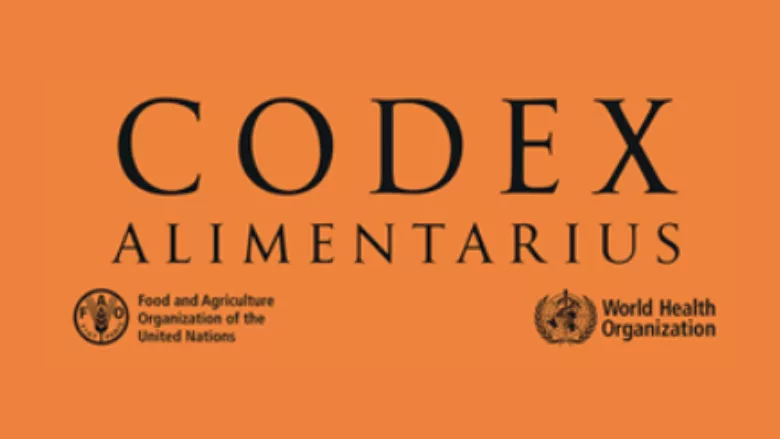Adoption of New Food Safety Standards at 46th Session of Codex Alimentarius Commission

The Codex Alimentarius Commission, a joint initiative of the Food and Agriculture Organization of the United Nations (FAO) and the World Health Organization (WHO), is meeting from November 27–December 2, 2023 for its 46th session in Rome, Italy to adopt new food safety and quality standards.
The adoption of the report of the session will be held on December 2 at 10:00 A.M. CET, but brief descriptions of some of the standards will be published as they are adopted, as follows:
- Guidelines for the Control of Shiga Toxin-Producing Escherichia coli (STEC) in Raw Beef, Fresh Leafy Vegetables, Raw Milk and Raw Milk Cheeses, and Sprouts: These guidelines will help risk managers and food business operators in their efforts to reduce foodborne disease by providing science-based advice and a practical guidance on the control of STEC in raw beef, raw milk, and raw milk cheeses. Further work on the control of STEC in fresh leafy vegetables and sprouts is under development.
- Guidelines for the Safe Use and Reuse of Water in Food Production and Processing: These guidelines give advice on the types of water that are suitable for different areas of food production and processing. They advise on a risk-based approach to safe water sourcing so that food producers, processors, and handlers can reduce and manage hazards associated with water in food production.
- Revisions to the Standard for Follow-Up Formula (CXS 156-1986): As part of the revisions to this text, the title has been changed from “Standard for Follow-up Formula” to “Standard for Follow-up Formula for Older Infants and Product for Young Children” to reflect the two distinct sections into which the standard is now divided. The first part ensures that follow-up formula, when used, will support the growth and development of older infants aged between six and 12 months. The second part of the text outlines the requirements for drinks or products for young children aged more than 12 months up to three years.
- General Standard for Food Additives: Inclusion of the Provision for Trisodium Citrate in Fluid Milk (Plain): Trisodium citrate is a stabilizer used in the processing of milk and, in particular, Ultra Heat Treated (UHT) bovine milk, in some countries. It has been the subject of discussion within the Codex Committee for Food Additives for some years, with differing opinions around the technological justification for its use in bovine milk. The adopted provision is restrictive in the use of trisodium citrate and imposes a numerical use level that will limit its application to sterilized and UHT milk from bovine species.
Update, November 26, 2023: The following standards have been adopted:
- Maximum Residue Limits (MRLs) for Zilpaterol Hydrochloride in Cattle Kidney, Liver, and Muscle: Voluntary MRLs for zilpaterol hydrochloride, a growth promoter, have been adopted, informed by risk assessment work undertaken by the Joint FAO/WHO Expert Committee on Food Additives (JECFA).
- Code of Practice for the Prevention and Reduction of Mycotoxin Contamination in Cassava and Cassava-Based Products: This new code provides governments and food businesses, growers, processors, and distributors with knowledge about factors that may lead to of mycotoxin contamination in cassava and cassava-based products, as well as ways to detect, reduce, or prevent such contamination. The text provides examples of Good Agricultural Practices (GAPs) and Good Manufacturing Practices (GMPs) that will help to minimize risk. It also provides a basis for training and education of all those involved in cassava production and trade.
- Principles and Guidelines on the Use of Remote Audit and Inspection in Regulatory Frameworks: New guidelines on the use of remote audit are intended to be applied in conjunction with other Codex texts and provide guidance on ensuring food safety oversight by national authorities, while also taking advantage of opportunities offered by modern information and communication technologies. The text outlines seven principles that should form the basis of remote audit and inspection in regulatory frameworks, and guidance on planning and implementation.
- Revisions to General Guidelines on Sampling (CXG 50-2004): The Codex Guidelines on Sampling provide those responsible for the development of sampling plans for product acceptance or food import or export acceptance with guidance on the design of such sampling plans. The revision reflects current scientific and statistical approaches for the development and evaluation of sampling plans.
- Revision of Classification of Food and Feed (CXA 4-1989): The Classification of Food and Feed is intended to ensure the use of uniform nomenclature and classification of foods into groups or subgroups for the purposes of establishing MRLs for pesticides in food and feed individually, or by covering groups of commodities with similar characteristics and residue potential. The Classification has been comprehensively revised over the past ten years to allow the reclassification and/or inclusion of commodities, especially those of interest for developing countries like minor crops, to provide group MRLs to enable the safe international trade of food and feed. The updated standard includes the revision of Class B and E—primary food commodities of animal origin and processed foods of animal origin, respectively. With the completion of these two classes, the revision of the Classification will enable the establishment of MRLs for wider commodity groups that are or have the potential to be marketed in international trade, a milestone achievement.
Looking for quick answers on food safety topics?
Try Ask FSM, our new smart AI search tool.
Ask FSM →








